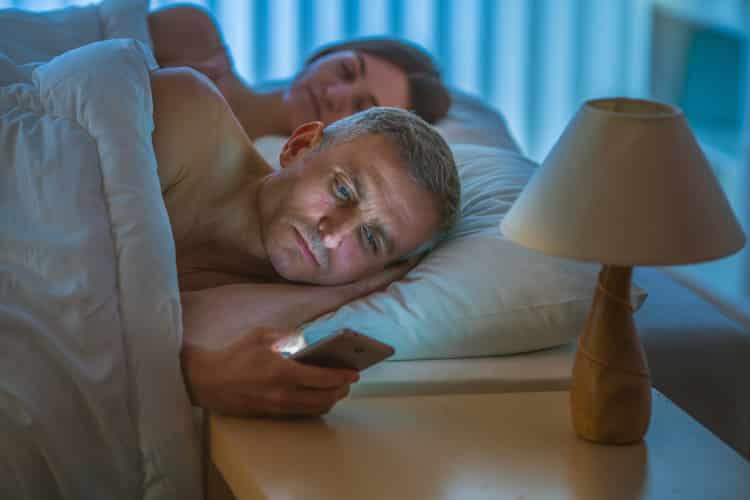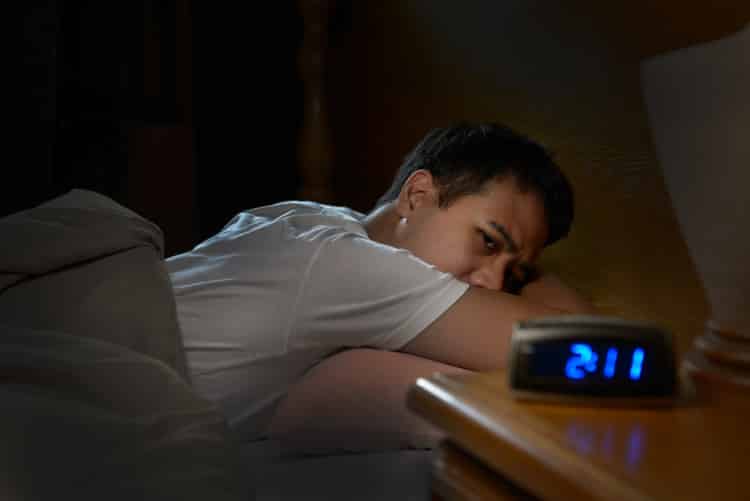Fall Asleep Faster (and Sleep Better) with Nature’s Gateway to Sleep: Hypnosis
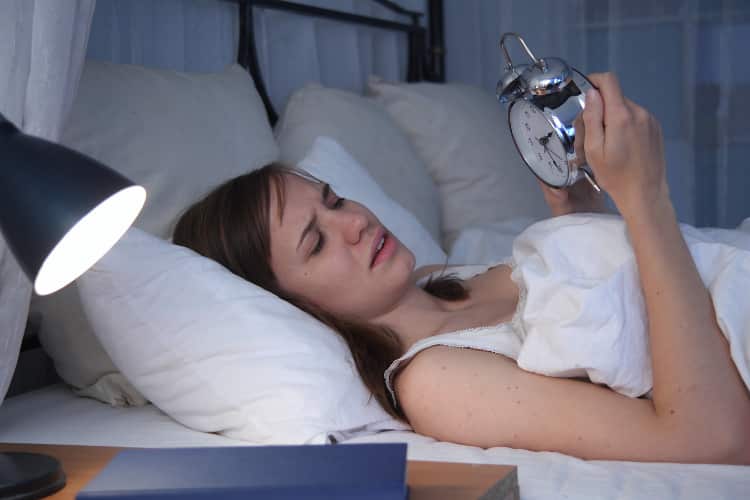
There’s little more frustrating than lying down after an exhausting day, only to find that you’re suddenly wide awake.
Even if you do manage to doze off, you might wake up again and again. Maybe you’re too hot or too cold, or you can’t stop worrying about tomorrow or rehashing the previous day’s events.
It’s also possible that you think you’re sleeping enough, but you still wake up feeling completely unrested. You might wonder if there’s any point in shutting down for eight hours if you don’t start back up reenergized and renewed.
So, what gives?
Isn’t sleep something your body and mind should just know how to do?
The truth is, many people have trouble sleeping. Even more struggle to enter the deep sleep stages that actually rest our brains and bodies.
Luckily, it’s possible to understand what’s disturbing your shut-eye and take simple steps toward a better night’s sleep.
Curious if hypnosis could help you sleep well?
Take our hypnotizability test and find out!
In this article, you’ll learn some of the reasons you might be struggling to sleep, as well as 10 strategies you can use to effectively fall asleep, stay asleep and wake up truly restored.
This includes sleep hypnosis, a natural gateway to sleep. By the time you’re done reading, you’ll know how it works, and how to find a hypnosis program that works for you.
But first, let’s take a look at what sleep really is, and why it’s so important.
What Happens When You Sleep?
If you’re someone who’s familiar with nights of wild dreams, you probably already know that sleep isn’t quite as passive as it might seem.
The truth is, sleep is a somewhat mysterious function of the human brain and body. We know that everyone needs sleep, but even scientists don’t have a single, unified definition of what sleep is.
So what do we know?
Well, to put it simply, sleep is a period of time when we shut our eyes and reduce mental and physical activity.
The key word there: reduce.
Even when you are in the deepest stage of sleep, your mental and physical activity doesn’t stop entirely. In fact, under ideal circumstances, your brain and body do the careful work of guiding you through the stages of sleep, so you can wake up feeling fresh and focused.
We’ll go into more detail about the stages of sleep later on. But for now, it’s important to understand that during most stages—especially those that are key for feeling rested—your heart rate, breathing and brain wave activity all slow and even out. Your body temperature drops. You cease to be reactive and tense, and instead become internally focused and tranquil.
But not everything slows down.
According to the Division of Sleep Medicine at Harvard Medical School, “Certain physiological activities associated with digestion, cell repair, and growth are often greatest during sleep, suggesting that cell repair and growth may be an important function of sleep.”
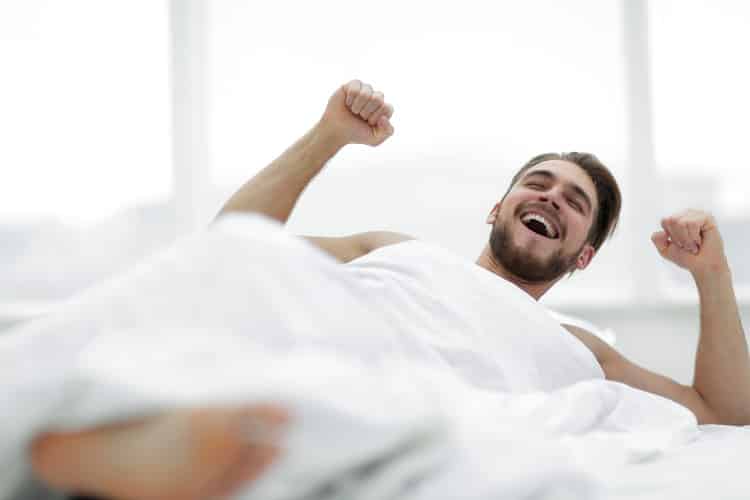
In other words, sleep keeps you physically healthy.
It keeps you mentally healthy as well, helping you process and store information and move through your wakeful hours without that all-too-familiar feeling of brain fog.
The four types of brain waves play an essential part in the science of sleep. In order from fastest to slowest, they are:
- Beta, when we are alert and focused
- Alpha, when we are relaxed and contemplative
- Theta, when we are in a highly relaxed, daydreaming, or even trance state (as when you are driving, “spacing out,” or hypnotized)
- Delta, when we are asleep, and brain wave frequency is at its lowest
When you set out to fall asleep, your brain will ideally move you through these four brain waves at a measured pace.
So, when you are falling asleep, you generate theta brain waves and naturally enter a state of hypnosis.
Theta state is the most fruitful for generating ideas. If your brain is able to move you toward wakefulness slowly, you can even stay in the theta stage for a prolonged period and enjoy increased mental creativity and productivity that could make it easier to get through the day.
Theta waves are only one step in waking up feeling recharged upon waking, though. It’s also important to understand that generating delta brain waves is essential for deep sleep. If you are not entering this state, you may not be getting the rest you need.
What Is Insomnia?
Insomnia is a sleep disorder that greatly disrupts a person’s ability to fall and stay asleep.
To support physical and mental health, most adults require about eight hours of sleep every night. However, many people get far less.
Those struggling with insomnia might try to go to bed at a reasonable hour, only to toss and turn throughout the night. They might even find themselves staring up at the ceiling until their alarm signals the start of the day.
Others might be able to fall asleep, but wake up again and again throughout the night. Or, they might wake up hours before their alarm and find it impossible to drift off to sleep again.
An inability to sleep does not mean that your internal battery, so to speak, has already been charged. Quite the opposite. Insomnia makes it impossible to sleep even when you are incredibly exhausted.
And, without an adequate amount of sleep, your brain doesn’t get the chance to cycle through the 5 sleep stages. This can lead to errors at work, confusion in conversations, and even impulsive or dangerous behavior.
So, what exactly are the stages of sleep, and what makes them so important?
The 5 Stages of Sleep (and Why You Need Them All)
Scientists have distinguished the 5 stages of sleep by noting “the characteristics of the brain and body during sleep.” For example, the 5th stage is known as Rapid Eye Movement (REM) sleep because of observations made about the eyes. Stages 1-4 are all non-REM sleep.
Movement through the stages can also be tracked by brain waves.
Let’s take a look at the unique characteristics of each stage:
Stage 1 Sleep
You can think of this stage as the bridge between wakefulness and sleep. Your breathing doesn’t slow quite yet, and your body doesn’t completely relax, but your brain waves begin to move from Alpha state to Theta state.
This is a light sleep stage, akin to daydreaming. You can still be easily awakened.
Stage 2 Sleep
This is a deeper stage of sleep, characterized by “Sleep Spindles,” or “very short periods of rapid, rhythmic brain wave activity.”
In this stage, you have a slightly cooler body temperature and slower heart rate. It becomes a bit more difficult to wake you up.
Stage 3 Sleep
If Stage 1 is the bridge between wakefulness and sleep, Stage 3 is the bridge between light sleep and deep sleep. Your brain begins to produce slow Delta brain waves.
It’s difficult to wake up during stage 3. If you are forced awake, you likely feel groggy, and you may struggle to focus or correctly complete tasks.
Stage 4 Sleep
This is the deepest stage of sleep, sometimes called “Delta Sleep” or, aptly, “Slow Wave Sleep.”
This deep sleep is extremely important for repairing cells, releasing natural hormones, and restoring energy. It also may be the most important stage for learning and memory.
Stage 5 Sleep
It’s long been thought that Stage 5 sleep—aka REM sleep—is essential for learning, memory, and the development of the central nervous system.
Even though your arms and legs are temporarily “paralyzed” during Stage 5, it is the most active of all the sleep stages. Your heart rate and breathing both increase in this stage, as does your brain activity. In fact, it’s generally agreed that REM sleep is where dreaming occurs.
How Does the Brain Move Through Sleep Stages?
Your brain doesn’t move through these sleep stages in order. Instead, it operates on a cycle, moving through stages 1–4 and then back from 4–2 before ever entering stage 5.
 Your brain aims to complete 4–5 sleep cycles a night. During the first cycle, you spend only about 10 minutes in REM sleep. By the last cycle, REM sleep might take up to an hour.
Your brain aims to complete 4–5 sleep cycles a night. During the first cycle, you spend only about 10 minutes in REM sleep. By the last cycle, REM sleep might take up to an hour.
If you wake up before a cycle is complete—say, for example, at Stage 3—you will likely feel unrested and unable to think.
If, on the other hand, you wake up at the end of a cycle, you can move smoothly back into an alert Alpha state, with the mental and physical energy you need to go about your day.
Of course, completing 4–5 cycles takes time. No wonder medical professionals recommend 8 hours of continuous sleep every night!
It’s important to note that your brain could need up to 90 minutes before it enters the first brief period of REM sleep. So, if you only sleep for an hour at a time, you likely never enter REM sleep or complete a full sleep cycle.
That means your body doesn’t get a chance to repair cells, and your brain doesn’t have a chance to process experiences and store memory.
Now you know that you likely feel tired, irritable and over-stimulated because something is interrupting your sleep cycles. But what?
The Real Reasons You May Be Struggling to Fall Asleep
Some people never complete a sleep cycle because they can’t fall asleep. Others have their sleep cycles abruptly cut short because they wake up in the middle of the night, perhaps multiple times.
Although there are differences between struggling to fall asleep and difficulty staying asleep, both are signs of poor sleep hygiene.
What’s sleep hygiene?
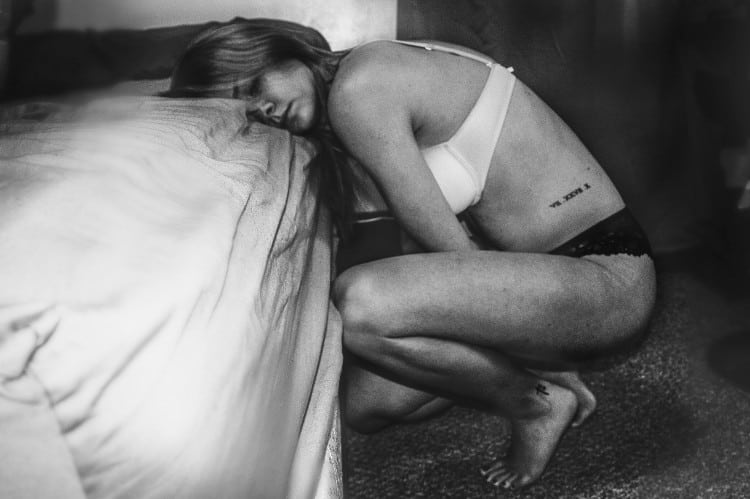
It’s a catchall term for the healthy nighttime habits and rituals that coax your mind and body to rest.
Soon, I’ll share 10 ways you can make good sleep hygiene the norm. But first, let’s take a look at the common feelings and behaviors that keep sleep at bay. Once you are able to identify the cause of your sleep troubles, you can better pinpoint solutions.
Racing Thoughts and Stress
The unfortunate truth is that we live a stressful world. Like so many others, you likely have a great deal on your plate.
And you might often feel worried and tense when you think about the future, especially if you lack confidence in your ability to handle challenges. In other words, you might be struggling with anxiety.
Anxiety doesn’t just mess with focus and motivation during wakeful hours. It also ramps up at night. This is especially true if you do something stressful right before bed, such as read the news or look over tomorrow’s extensive to-do list.
In fact, according to Dr. Michael J. Sateia, professor of psychiatry and chief of sleep medicine at Dartmouth Medical School, “During the day, we can use a variety of strategies to modulate these concerns, including taking direct action to address them. Lying in bed in a dark room, they become overwhelming and inescapable.”
Racing thoughts make it almost impossible to slow down your brain and fall asleep. In fact, you might even start worrying about the physical and emotional consequences of being unable to sleep.
The bottom line: Bedtime anxiety and insomnia make for one vicious cycle.
Chemicals and Consumption
Most people probably have some idea that consuming caffeine before bed makes sleep more difficult. But that late-night cup of coffee isn’t the only culprit.
Alcohol also disturbs sleep. While a drink or two might make it easier to nod off, it also throws your sleep cycle out of whack.
Alcohol increases those deep sleep Delta brain waves but triggers Alpha brain waves at the same time. In addition, alcohol prevents REM sleep. That means your brain doesn’t get the deep sleep it needs.
Late night sugary snacks can also keep you up at night, especially as your body rushes to process and store the influx of energy. Eating foods that you are sensitive or allergic to can also set your system on high alert and may cause aches, itching, and inflammation that keep you uncomfortable even in the most luxurious bed.

Finally, many medications can also impact sleep. According to Harvard Medical School, some medications used to treat heart issues, high blood pressure, inflammation, asthma, colds and flus, hypothyroidism, asthma, and psychological conditions, such as depression, anxiety, and ADHD, can all fuel insomnia.
That doesn’t mean you should stop taking prescribed medication! But if you believe medication may be contributing to difficulty sleeping, it is worth bringing up with your doctor.
Your Body’s Natural Response to Your Sleep Routine
To fall asleep, you need both mental and physical comfort and calm. But there are many factors that can make your internal and external world feel chaotic.
For example, intense exercise floods you with adrenaline, raises your heart rate, boosts your metabolism, and puts your overall physiological system in high gear. All of these natural responses keep you awake, even when you should be tired out.
Bright lights, loud noises, too much heat or cold, and an uncomfortable mattress or pillow can also keep you tossing and turning. In fact, even looking at a bright screen in the hours before bed can block the release of melatonin, a hormone which tells your body that it’s time for sleep.
Existing Conditions
Some health conditions can make sleep challenging. For example, adrenal fatigue can cause higher levels of cortisol (the stress hormone) and adrenaline, which keep you tense and alert.
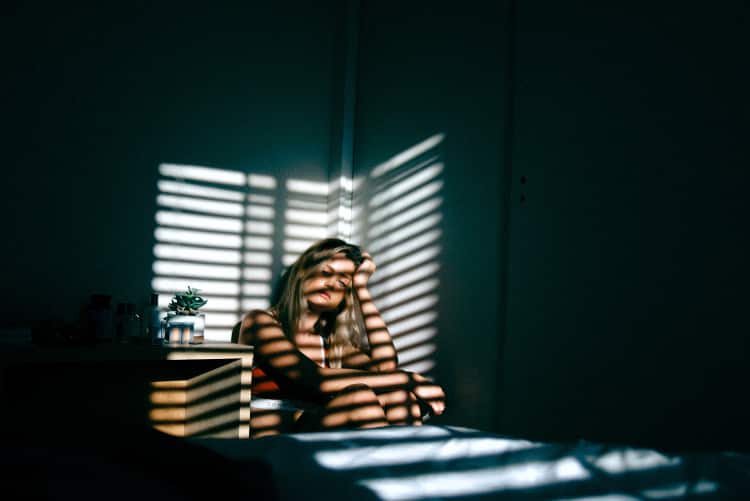
Sleep apnea disrupts rest by preventing regular breathing during sleep. According to the National Heart, Lung, and Blood Institute, “It can occur when the upper airway becomes blocked repeatedly during sleep, reducing or completely stopping airflow.” Snoring and gasping for breath during sleep are common signs of apnea.
Normal hormone changes that occur with aging also impact sleep. For example, aging often coincides with a decrease in melatonin. Research also shows that hormonal changes in peri- and post-menopausal women also cause sleep disturbances, in part due to difficulty regulating body temperature.
And, regardless of age, changes in a sleep routine or an increase in napping can make it difficult to fall asleep at night.
For a Better Night’s Sleep, Do These 10 Things Before Bed
There are many small changes you can make to fall asleep faster and stay asleep longer. You can even try one of these sleep hygiene techniques tonight!
1. Use a Sleep Tracker
By measuring your nighttime movements, a sleep tracker can help you keep an accurate log of how much you’re really sleeping.
Remember, temporary paralysis occurs during REM sleep. So, if you’re flipping over or kicking off the covers through the night, you’re probably not getting as much rest as you think.
Some sleep trackers can also pick up the sounds of your breathing. This can help you become aware of snoring, gasping, or other signs of sleep apnea that you’re unlikely to hear as they happen.
Because sleep trackers can store this information across weeks, months, and even years, they provide the data you need to monitor changes. You can also identify sleeping patterns: for example, you might get better rest some days of the week than others.
This allows you to take note of behaviors or activities that seem to align with sleepless nights. With more information about why you are struggling to sleep, you gain the power to make informed changes to your routine—as well as some motivation to practice good sleep hygiene.
2. Stop Using a Sleep Tracker
While keeping tabs on sleep does help some people rest easier, it can also create a sense of pressure that isn’t ideal for nighttime relaxation.
In fact, this study found that many people who use sleep trackers become so preoccupied with “with improving or perfecting their wearable sleep data” that they focus on their numbers more than their actual quality of sleep.
The researchers write, “Given that these devices tend to overestimate sleep, they may have served to reinforce poor sleep habits by encouraging extending time in bed.”
So, if you suspect that sleep tracking is causing more stress than rest, kick the device out of your bedroom.
3. Hide Your Clock
Just like sleep trackers, clocks can be a source of unwanted bedtime pressure.
It’s easy to get fixated on falling asleep and waking up at certain times, and then becoming frustrated and self-critical when your brain has different plans.
And, as we discussed above, this kind of sleep anxiety can work in a loop, making it harder to enjoy your much-needed shut-eye.
So try not to fixate on your sleep schedule. Hide your alarm clock across the room and let yourself drift away from deadlines until the morning.
4. Make Your Bed a Place for Sleep
It can be tempting to lounge in bed while watching TV or even working. However, while you might be a bit more comfortable during these waking activities, you’re likely also starting to associate your bed with stress. And as you know, stress makes it much harder to sleep.
On nights you find yourself tossing and turning, get up (out of bed) and do something relaxing for 10 minutes. This will also help you avoid associating the bedroom with stress.
When you reserve your bed for sleeping, your brain and body will start to recognize that lying down equals slowing down. This is essential for a good rest routine.
5. Practice Deep Belly Breathing
 From Sleep Stage 1 to Sleep Stage 4, your breathing becomes even and slow. Anxiety, on the other hand, keeps breaths erratic and rapid, signaling that your body is on high alert.
From Sleep Stage 1 to Sleep Stage 4, your breathing becomes even and slow. Anxiety, on the other hand, keeps breaths erratic and rapid, signaling that your body is on high alert.
Thankfully, by regulating your breath, you can coax your body and mind into calm.
Make the conscious choice to inhale deeply and slowly, until you feel the air filling your lungs. Then, exhale just as slowly, letting air seep gently through your mouth.
If this doesn’t work, you can try the effective 4-7-8 breathing technique: “You simply breathe in through your nose for four seconds, hold your breath for seven seconds, and exhale through your mouth for eight seconds.”
Keep to this pattern, and you’ll guide yourself to sleep.
6. Create a Comfortable Environment
When it comes to sleep, comfort is key. Here are a few small adjustments that aid relaxation:
- Turn down the temperature
- Darken the room (whether by shutting off the lights, installing blackout curtains, or investing in a quality sleep mask)
- Eliminate noise distractions (make sure your bedroom is in a quiet spot, use white noise, or use a pair of earplugs)
- Invest in a comfy mattress and pillow
- Wear comfortable, loose-fitting sleepwear (or go nude)
7. Stick to a Sleep Routine
Good sleep hygiene requires consistent, healthy nighttime habits. With a bit of experimentation, you can figure out the rituals you enjoy—and those you actually want to maintain.
For example, you can try the following:
- Dim the lights 2 hours before bed
- Don’t look at screens (that includes your phone, laptop, or TV!)
- Don’t work out before bed (though mild stretching and deep breathing can be helpful)
- If you eat, stick to small and healthy snacks
- Try listening to relaxing music (60–80 bpm), reading, taking a bath, or meditating about 30 minutes before bed
- Avoid naps
Once you find the right routine, stick with it. Going through the same steps every night can help your mind and body prepare for sleep.
8. Progressive Muscle Relaxation (PMR)
PMR is a great tool for recognizing and releasing tension. Basically, it involves tightening and relaxing one muscle group at a time, starting with your feet and calves and working your way up to your core and even your face.
Here’s how you can do it:
- Inhale slowly, flex one of your lower muscle groups (e.g., your calves) and count to 10.
- On 10, breathe out and quickly relax those muscles, imagining the days stress melting from your body. Stay aware of how you feel, mentally and physically.
- Rest for 10 seconds (or up to 20, especially as you get closer to sleep).
- Move up to the next muscle group and repeat.
PMR can take a bit of practice. Try doing it every night for two weeks before you give up!
And remember—it’s definitely okay if you fall asleep long before you flex your face.
9. Consider Natural Sleep Aids
\Sleep is essential for healthy functioning, which means insomnia can quickly become a serious health concern. If you have been running on empty for a while, or if you feel really stuck in sleep anxiety loops, there’s nothing wrong with looking into a sleep aid.
In addition to the extensive selection of sleep medication/pills your doctor may prescribe, there are a number of natural sleep aids that may do the trick.

These include:
- Magnesium
- Melatonin
- Calcium
- Passion Flower
- Valerian Root
- Chamomile Flower
- Vitamin B-3
To learn more about these natural sleep aids and others, check out “Natural Sleep Aids: 8 Ways to Get a Better Night’s Sleep (without Pills).”
10. Try Sleep Hypnosis or Guided Meditation
The truth is you can’t consciously will yourself to sleep. That just creates pressure and stress, making sleep another responsibility rather than a respite.
Like a lullaby for adults, sleep hypnosis and guided meditation can both help you stop thinking about sleep… and actually start sleeping.
Let’s take a closer look at sleep hypnosis and guided meditation: how they’re different, and how you can find a routine that eases you into dreamland.
Curious if hypnosis could help you sleep well?
Take our hypnotizability test and find out!
Can Guided Meditation or Sleep Hypnosis Help?
Sleep hypnosis is an effective technique or treatment used to help people escape insomnia and enjoy regular, restful sleep.
Hypnosis aids in reducing anxious thoughts and shifting your mindset so you can enter the relaxed state that’s necessary for restful sleep. But remember, you can’t consciously think your way into sleep—and you can’t fight your way into relaxation!
Hypnosis is effective because it works underneath conscious worries and racing thoughts, tapping into your subconscious so that you can prepare your brain for sleep at a deep level. This lays the foundation for healthy sleep cycles, which are key for waking up truly restored.
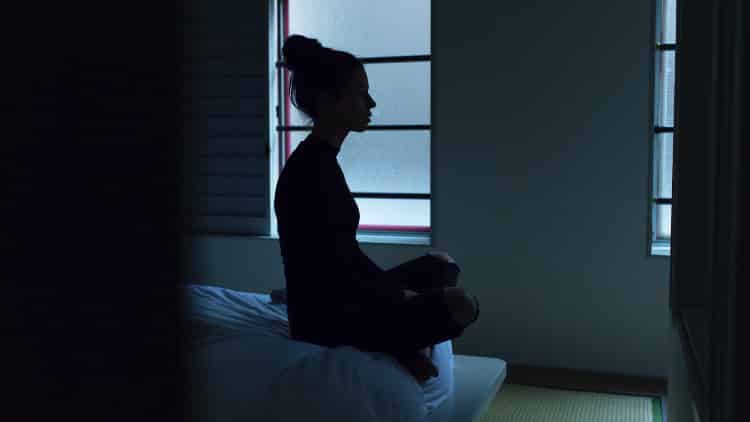
On the surface, hypnosis might sound similar to the guided sleep meditation podcasts and videos popping up across the web. And, it’s true: both guided meditation and sleep hypnosis utilize soothing audio recordings to slow thoughts, release stress, and lull users into rest. Some users find that the two are “not that much different.”
So, what sets these sleep techniques apart?
It might be useful to think of hypnosis as meditation with a goal. Meditation is usually centered around the idea of fully engaging in the moment, without judgement or expectation. It’s more focused on being rather than doing.
Hypnosis, on the other hand, is about laying the groundwork for specific, sustainable, positive change. For example, many people use hypnotherapy to curb addictions or uproot negative self-talk. It fosters transformative doing.
Because sleep meditation is specifically aimed at aiding sleep, it is one step closer to hypnosis. However, it is generally less structured than hypnosis. Meditation recordings will guide you to focus your awareness on relaxation and anticipation of a good night’s sleep.
Hypnosis recordings, on the other hand, begin with an induction—the words a hypnotherapist says to guide you into a trance state—followed by hypnotic suggestions. That does not mean the hypnotherapist is forcing you to do things you don’t want to do. Rather, they are leading you to the restful state you crave.
Hypnotic scripts are also generally designed to communicate with the subconscious mind, which is less literal and logical. So, they’re more likely to include imagery and metaphor. And, as mentioned above, speaking to the unconscious mind is an important piece of preparing the brain for peaceful slumber.
So while guided meditation can certainly be effective, hypnosis is truly the gateway to sleep.
How Does Sleep Hypnosis Work?
Because sleep is such a personal, private activity, sleep hypnosis is generally offered in the form of audio recordings you can listen to at home.
A certified hypnotherapist will speak with you through your headphones, guiding you to relax your mind and body. Then, the hypnotherapist will gently move you into a trance state that’s similar to Stage 1 Sleep. Recordings might include soothing music, peaceful nature sounds, or binaural beats to help produce the Theta brain waves that align with deep sleep.
Throughout the recording, the hypnotherapist will offer positive hypnotic suggestions. For example, they will tell you that you can sleep well.
More than that, they will communicate to your subconscious mind in a way it can understand, creating greater core optimism that disrupts the self-fulfilling loop of sleep anxiety.
To fall asleep, you must believe you can. Because that’s the truth—you can!
Sleep hypnosis also creates a stronger relaxation response, which diminishes the production of stress hormones that interfere with sleep.
For example, feeling stressed—whether it’s about a relationship, an issue at work, or money—triggers a “fight-or-flight” response, which causes your body to produce stress hormones like adrenaline. It’s virtually impossible to sleep during an adrenaline surge. That’s why thinking about the stresses of tomorrow, next week or next year are so unpleasantly efficient at blocking sleep in the moment.
Sleep hypnosis robs stressful thoughts of their power. And improving your ability to turn off the stress response with a stronger relaxation response will lay the foundation for a better night’s sleep, every night.
 In summary, hypnosis helps you:
In summary, hypnosis helps you:
- Immediately slow your mind and body through relaxing music, nature sounds, and binaural beats
- Create greater optimism
- Create a stronger relaxation response
Because it soothes in the moment and teaches your mind how to prepare for sleep, hypnosis is effective for both acute and chronic insomnia.
In fact, one study of 70 healthy women found that, “After participants listened to the hypnotic suggestion to ‘sleep deeper’ subsequent slow wave sleep was increased by 81% and time spent awake was reduced by 67%.”
In other words, after hypnosis, these women slept 81% more time in deep sleep than they had without hypnosis.
Another study—this one unpublished—focused on a group of 49 participants with primary insomnia. Before and after hypnosis, these participants rated their sleep using the Pittsburgh Sleep Quality Index (PSQI), which measures sleep quality on a scale of 0 (better sleep) to 21 (poorer sleep).
After using a hypnosis program for a two-week period, the participants’ average PSQI score was over 8 points lower than it had been before starting the program. That’s a 38% average improvement in sleep quality!
But not all sleep programs are created equal. It’s important to consider carefully when making your selection.
How Do I Choose a Good Hypnosis Program?
First and foremost, any high-quality hypnosis program needs a certified hypnotherapist at the helm. Certification means the hypnotist has gone through legitimate training and supervision.
When a certified hypnotherapist creates a sleep hypnosis audio program, you can rest assured that they have the skills and experience to help you catch some Z’s.
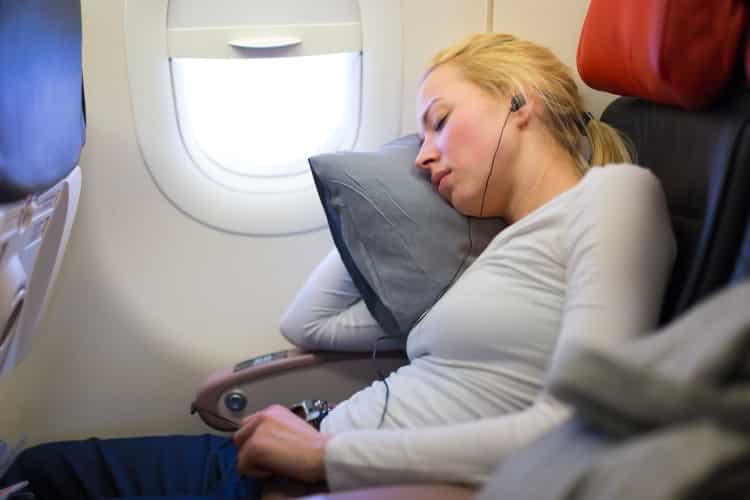
You can also tell that a hypnosis program is likely to be effective if Progressive Muscle Relaxation is used in the induction portion. PMR works well as part of a hypnotic induction because it releases both physical and emotional stress, which sets the stage for the hypnotic suggestions that follow.
Many people also prefer a female speaker. Interestingly, this is also true of those who enjoy autonomous sensory meridian response (ASMR) audio and video.
(ASMR while deeply relaxing for some, is more likely to spark pleasant “brain tingles” than deep sleep brain waves, and shouldn’t be considered a replacement for certified sleep hypnosis audio.)
Perhaps this simply means that many find female voices softer, with a more relaxing tone and tempo. However, the speaker’s gender does not really matter much. What’s most important is that you find a recording that is calming to you.
And, remember, don’t throw in the towel after your first try. If you are patient with yourself and the hypnosis process, you can let hypnosis lead you into peaceful nights of truly restorative sleep.
Better Sleep Is Just One Night Away
There are many reasons people struggle to sleep well and feel rested, from racing worries to bedtime discomforts to medical issues. Finding a cause makes it possible to find a solution.
That can be easier said than done, though. And many people need help developing a routine that helps them sleep well. The tips listed in this article aim to provide you with options you need to create a routine that works for you.
Regardless of whether you generally struggle to fall asleep or stay asleep, hypnosis is an effective remedy with lasting results. You can claim the restful nights you’ve been longing for.
Sleep is a rich and important subject; I invite and encourage you to learn more by reading these related posts:
- What Is Insomnia? (The Real Reason You May Not Be Sleeping Well)
- Natural Sleep Aids: 12 Supplements for a Better Night’s Sleep
- How to Fall Asleep Fast: 7 Tips You Can Use Tonight (Without Pills or Medication)
- What Is Sleep Hygiene? 11 Steps to Get a Better Night’s Sleep
- Considering Sleeping Pills? [Insomnia Medication Review]
Curious if hypnosis could help you sleep well?
Take our hypnotizability test and find out!
Links:
https://www.scientificamerican.com/article/what-is-the-function-of-t-1997-12-22/
https://www.mayoclinic.org/diseases-conditions/insomnia/symptoms-causes/syc-20355167
https://www.sleepassociation.org/about-sleep/stages-of-sleep/
https://psychcentral.com/lib/stages-of-sleep/
https://www.hopkinsmedicine.org/health/healthy-sleep/sleep-science/the-science-of-sleep-understanding-what-happens-when-you-sleep
https://www.medicalnewstoday.com/articles/247927.php
http://www.health.com/health/condition-article/0,,20188528,00.html
http://time.com/3671777/drinking-sleep/
https://www.webmd.com/sleep-disorders/news/20130118/alcohol-sleep#1
https://www.health.harvard.edu/newsletter_article/medications-that-can-affect-sleep
https://www.scientificamerican.com/article/bright-screens-could-delay-bedtime/
https://www.nhlbi.nih.gov/health-topics/sleep-apnea
https://academic.oup.com/jcem/article/85/6/2135/2850828
https://www.ncbi.nlm.nih.gov/pmc/articles/PMC4621258/
https://www.self.com/story/how-to-know-if-your-sleep-tracker-is-helping-or-hurting-your-sleep
http://jcsm.aasm.org/ViewAbstract.aspx?pid=30955
https://thethirty.byrdie.com/how-to-fall-asleep-fast
https://www.countryliving.com/life/news/a44587/sleeping-cold-room/
https://www.wikihow.com/Fall-Asleep
https://www.webmd.com/sleep-disorders/muscle-relaxation-for-stress-insomnia
https://www.fastcompany.com/40481384/what-happened-when-i-tried-hypnosis-to-get-a-better-nights-sleep
https://www.ncbi.nlm.nih.gov/pmc/articles/PMC4015388/
https://www.ncbi.nlm.nih.gov/pubmed/2748771
http://web.wellness-institute.org/blog/bid/265955/How-to-Obtain-Hypnotherapy-Certification


